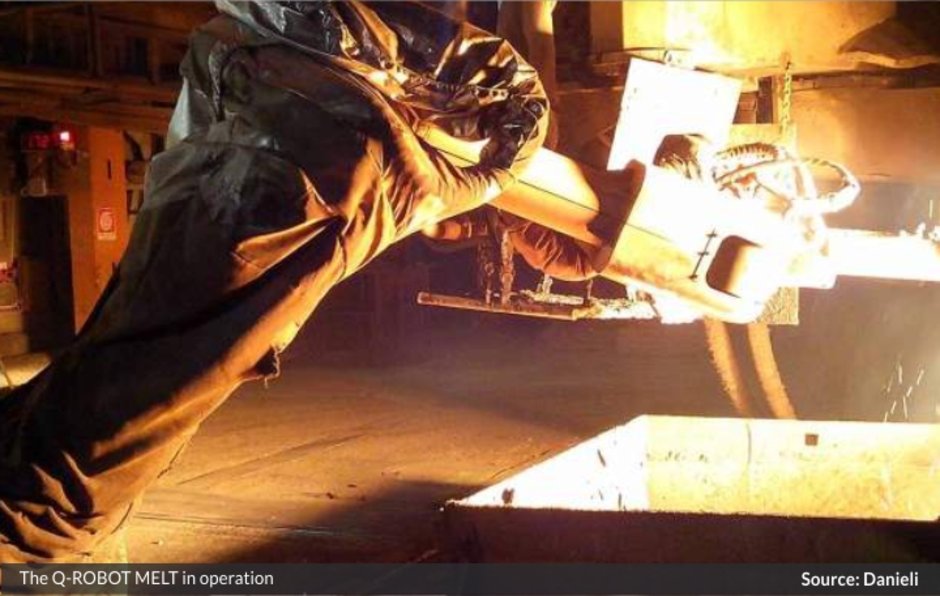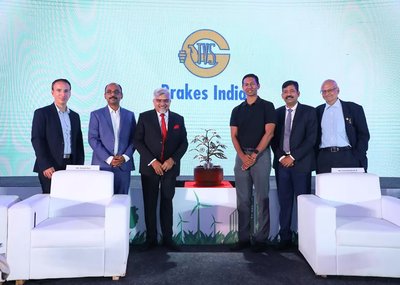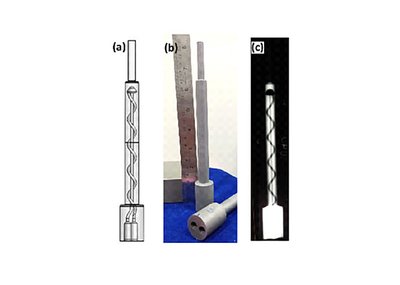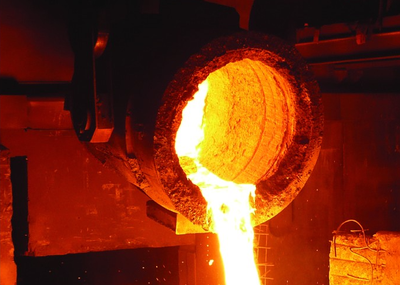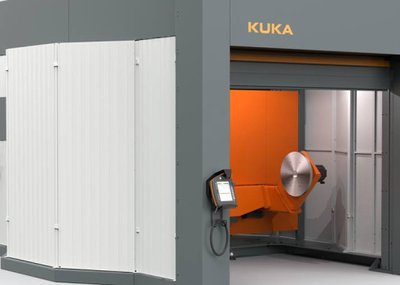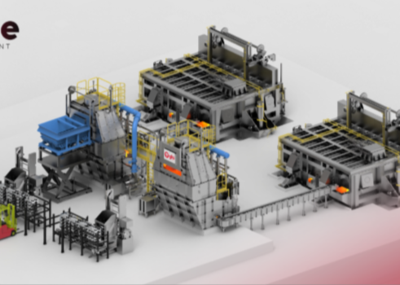With the objective of optimising productive volumes, captains of the global steel industry are embracing automation to ensure efficient control of the process flow. Advanced instrumentation and state-of-the-art electrical solutions are an integral part of the automation revolution that is ushering in a new era in the industry. Digitisation and data analytics are bringing about fundamental changes in the industry at a time when innovation has become inevitable for manufacturers looking to retain their competitive edge.
Smart Manufacturing
As a leading global technology provider, Danieli Automation offers a range of process control and instrumentation techniques for the metals industry which cover a wide spectrum of technology, ranging from refining iron ore to processing long and flat products. Danieli designs and supplies complete electrical distribution systems up to turnkey solutions for the steel industry, with installation engineering based on extensive experience.
It also produces special instruments and sensors, designed and engineered to meet the demand for sophisticated controls, quality certification, cost optimisation and quick adaptation to the latest technologies.
Explaining the characteristic features of a “smart steel factory”, Ranjit Deshmukh, Sales Head (Automation Division), Danieli India Ltd, tells Steel360: “A smart factory is operated from a single pulpit, where a few operators supervise the fully automatic production process. Monitors in the pulpit show all the main technical parameters and the reports are generated by a huge amount of data and variables, coming from the automation systems and from smart sensors, highlighting possible quality or process issues and suggesting corrective actions.”
CCTV camera images are used for visual monitoring. “Machines are designed to avoid manual operations and robots are used in dangerous areas or wherever operations are repetitive and frequent. Cranes are, as much as possible, unmanned and supervised from a single pulpit. Danieli’s Condition Monitoring System helps in the detection of mechanical anomalies and suggests preventive maintenance. The production programme is optimised in order to process the orders with a schedule which allows the best machine utilisation and the lowest operational expenditure (opex) production route, with a focus on final customer satisfaction in terms of quality and on-time delivery,” he says.
The 3Q Concept
Danieli’s automation systems are based on the 3Q concept: Quality, Quantity and Quickness. Ensuring the quality of the final product is essential to guaranteeing competitiveness, access to new markets, reputation and improved margins. One of the principal aims of the automation systems is to assist customers in producing quality products, ensuring continuous monitoring and providing quality certification of the final product. High quality control systems with constant innovation of process technologies guarantees top quality production in steel mills.
Automation systems are designed with a view to maximising productive volumes. Danieli’s system designs guarantee high availability and efficiency, thanks to advanced solutions for specific process aspects as well as a complete line of technological packages, including integrated automation equipment. Fully automatic and repetitive operations increase productivity levels and this is made possible due to the automation system architecture, with client-server solutions and dedicated monitoring tools.
It is crucial for manufacturers in the age of sweeping technological changes to respond quickly to changing market demands and product changes, too, must therefore be quick. This is obtained by means of flexible control systems and process controls, including the required set-ups for the complete production range. Quick production steps are obtained through pre-defined and fully automatic sequences. Danieli’s dedicated technological packages are applied for prompt system reaction to unusual circumstances.
Embracing Automation
In order to offer expert and focused service to customers, Danieli Automation has established different business units, one for each specific category of products offered. These units are steel making and casters, power systems, long products, flat products, instruments and robotics and customer assistance. This division into separate business units aims at further increasing specialisation and targeting more precisely and accurately the specific technological needs of each production line. Moreover, this structure improves the company’s focus on innovation, since engineers are dedicated to analysing the technological solutions for each particular product or business area.
Process control systems for iron and steel making are designed to support production of high quality steel, minimising consumption of energy, electrodes, refractories and utilities as well as consumption of raw materials. Process control systems permit consistent, repeatable and safe operations. These innovative solutions are proposed together with up-to-date expertise in process modelling, from direct reduction (DR) plants and scrap yard through primary and secondary metallurgy to final cast products.
The company’s integrated system is perfectly suited for high speed controls and modelling of flat mills – single or multi-stand, hot or cold. Auto-adaptive models and specialised sensors are the means to producing quality, together with specialised technological packages.
In the long products segment, Danieli Automation, with several decades of experience and hundreds of applications in mills for bars, wire rods, medium to heavy sections, rails and relevant finishing facilities, continues to transfer the know-how and technology of Danieli’s long products leadership to end-users. Continuous research in electromagnetic fields, infrared detection and lasers and X-ray has resulted in the development of new sensors and instruments for the steel industry.
Revolutionary Potential Of Robotics
“Automation holds the potential to reshape the Indian steel industry. However, the industry in India today still has a long way to go when it comes to catching up with the latest developments in this field. Some integrated steel makers in India are evincing interest in adopting our systems. Danieli is far ahead of other competitors in the field,” says Deshmukh.
“The implementation of robotic technology in Indian steel mills, for example, is still at a nascent stage. Danieli Automation has developed robots to perform fully automatic operations in dangerous areas, such as in close proximity to casting platforms or electric arc furnaces (EAFs) as well as galvanising lines. Sophisticated metallurgical models, developed in collaboration with research centres and universities, enable us to predict the quality of the final product during rolling. Cooperation with the main electrical and automation suppliers is constant with the aim to provide new solutions and cost-effective systems to our customers,” he adds.
Take the case of Q-ROBOT, for example, which is the result of an advanced alliance between industrial robotics and process automation. A set of solutions for each production area allows the introduction of flexible automation in dangerous places where human intervention is still necessary to finalise the production.
A robot enables the work done by men to be relocated to healthier environments and it also deals with repetitive and labour intensive tasks which are closely related to poor process quality. However, full adjustments of all parameters are available to the operators. All Q-ROBOT systems are specifically designed for use in harsh environments with severe pollution.
A few of examples should suffice to drive home the point. The Q-Robot CAST LADLE is a six-axis multifunctional robotic solution equipped with a special multi-purpose tool that performs, with a single manipulator, up to four different actions in the ladle area: ladle nozzle identification and oxygen opening, shroud manipulation, tundish powder management and tundish temperature sampling with chemical analysis. Each task has a special dedicated tool. All these tools are stored in a rack positioned near the robotic cell. The system is provided with an artificial vision that automatically identifies the nozzle position. With the Q-Robot CAST LADLE men are no longer physically involved in the casting floor area.
Similarly, MOULD is a robotic system for powder management in the casting process. The Q-Robot CAST MOULD is a solution for the dosage and distribution of casting powder in continuous casting machines for slabs, blooms and billets. The system guarantees a thin and uniform powder thickness over the whole casting process. This results in a higher and more consistent quality of the cast product. The robotic system can operate with up to four different hoppers used for different casting powders, also for the same casting sequence. With this system, the presence of powder supervisory personnel, operating in hazardous areas, is no longer necessary.
Digi & Met
Danieli Automation has developed a technology which, assisted and integrated by a modern automation system, is able to prevent and/or correct deviations from the desired process profile. The aim is to move from a reactive to a proactive design, thanks to the complete digitalisation of the processes. The expected consequences for customers are a drastic drop in transformation costs while maintaining the same level of productivity, enhancing product quality and reducing the consumption of scarce and expensive resources.
“Collaborative robots and mobile equipment devices, supporting the operators’ usual functions, will help them to avoid mistakes, increase product quality and workplace safety. Additionally, the role of sensors in steel making will become more and more important due to the intensive application of Internet of Things (IoT) technology,” points out Deshmukh.
“Danieli Automation has created Digi & Met, a working group based on experiences in process control and product technology. In Danieli we started working on data analytics and intelligent manufacturing many years ago, and today we have a dedicated business unit named Digi & Met and a new building where process technologists and automation experts work together to extract the added value that innovative technologies can provide,” quips Deshmukh.
Explaining the importance of predictive maintenance, he says: “Most steel plants rely only on breakdown maintenance, when repair actions are taken only after machine failure, with the consequent downtimes. Preventive maintenance is instead executed on a regular basis, regardless of their condition, and therefore not optimising Opex for spare parts. Predictive maintenance, on the other hand, uses the Danieli Condition Monitoring System (DCMS) to identify changes in signal values which might indicate a defect which will lead to a failure (typically vibration and temperature). DCMS is essential for critical parts such as gearboxes, motors, shafts, fans and pumps) in order to avoid unwanted and uncontrolled stops in the plant due to failures. The benefit is the reduction of delays in the plant and, therefore, increased working time, or more productivity, while Opex is also optimised as repairs are done only when needed.”
In a smart factory the analysis of variables from DCMS allows for predictive maintenance, contributing also to generating a database of maintenance data and Opex reduction as well as higher reliability of equipment.
New Beginning
Steel mills in India are slowly adopting level 1 automation and instrumentation techniques, says Deshmukh. For example, Danieli India Ltd. (Automation Department) has been selected by Sunflag Iron & Steel Company to supply the drives and process automation for the company’s new 320,000 tonnes per year bar mill at Bhandara in Maharashtra. The company has set up the production facility to manufacture high-quality special steel grades (mild and alloy steel rolled products).
“The supply includes new level 1 automation, instrumentation, AC main drives, regenerative DC common bus technology, auxiliary drives, main stand and shear LV motors and motor control centres for the bar mill,” says Deshmukh.
The new bar rolling mill will be placed after the existing blooming mill (previously installed by Danieli Morgårdshammar) in order to produce steel bars in diameters ranging from 45 mm to 120 mm.
“Sunflag has chosen Danieli Automation both for its consolidated know-how in rolling mill process control and for its proven capability to deliver a complete automation system in a very short time,” informs Deshmukh.
The horizons are expanding for Indian steel makers and advanced automation and process control technologies will increasingly gain acceptance as the industry gears up to take a great leap forward.
Source: NIRMALYA DEB, steel-360.com

